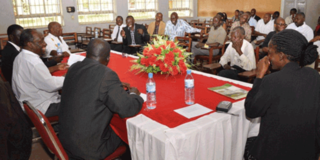How Ngugi wa thiongo awed Uganda's literature greats

Ngugi meeting lecturers and professors at the Literature Department, Makerere University recently.PHOTO BY Rachel Mabala
What you need to know:
On his visit to the Literature Department of Makerere University, Ngugi wa Thiongo left lecturers, poets and novelists awestruck.
It can be overwhelming to be in the presence of a man you are deeply in awe of. But when the overawed are men of letters and professors, you cannot help rolling your eyes.
Last Saturday was tranquil like it had sensed the significance of that day, but not even that calmed a party of writers and scholars that sat in Lecture Room 4 in the Department of Literature at Makerere University, fidgeting in their seats, chatting meekly and laughing nervously as they awaited for their distinguished guest.
When Prof Abasi Kiyimba stroked his greying goatee and wondered what one can say to a man of distinction such as the one they were awaiting for, Prof Arthur Gakwandi felt safer revealing he had just finished reading the man’s biggest and finest work, The Wizard of the Crow (2006).
“It is polemic. Ngugi has always been a polemicist,” said the author of Kosiya Kifefe (1997).
The door then creaked, and all eyes swung to the entrance. Yes! It was the renowned novelist, dramatist and social-activist Ngugi wa Thiong’o, right on time: 11a.m. The hosts stood up, clapped, bowed in obeisance and brazenly gaped—all at once.
Down-to-earth author
Ngugi has a peaceful demeanour and a saintly gait. He was clad in a collarless button-down white shirt with long sleeves slightly rolled back, grey trousers and black sneakers. Grey strands colour his receding hair and give him a sagely look. He is physically robust, with a bit of a paunch. Still, it is amazing that at 75, he had no walking stick. Is it because he is “down-to-earth”, as comedian Pablo humorously describes short men? Though the shortest man in the room, his intellectual height reaches the heavens! That is why many were helplessly effusive in their praise. The first said he was unfit to untie Ngugi’s shoelaces, another said he could not believe the author was human while Audace Mbonyingingo, whose undergraduate dissertation was on Ngugi’s Penguin Modern Classic, Petals of Blood (1977), was overcome with emotion.
“With Ngugi’s fiction, there’s nothing to dislike,” he told Daily Monitor. “Everything is profoundly tremendous. When you read one, you must read the other because all his books advance each other. So when I heard he would be here, I could not sleep till I saw the writer.”
Even Prof Timothy Wangusa, the jocular author of Upon This Mountain (1989) was wistful when he talked about having joined Makerere University in the year Ngugi was leaving (1963): “I just saw the back of you,” he said of his misfortune, throwing the room into laughter.
Novelist Regina Amollo of A Season of Mirth (1999) was breathless about how she “came running from the village (Kaberamaido) after hearing Ngugi was in town.”
Dr Susan Kiguli who delivered a welcome message, was close to tears of delight as she gushed about how the Literature Department felt privileged to host their outstanding alumnus: “What is more thrilling is that we can lay claim to you and can associate you with this room in which we are and even more, request you to point your favourite spot or any fond memories of this room.”
With a boyish smile, Ngugi pointed at a seat in the centre of the room and said it is where he sat when first began crafting his first novel, Weep Not, Child (1964). The room shook with applause. His presence in the very room he sat as an undergraduate student in the early 1960s activated fond memories of what an intellectual and literary hub Makerere University was back then. There was a powerful literary magazine called Dhana that whetted his writing skills. The illustrious author recalled the Makerere Writers Club, the book exchanges, the impassioned discussions, creative thinking and the short stories and poems they wrote most of which were read and discussed on the BBC and Radio Uganda.
These were also the days of the Makerere Travelling Theatre, for which he wrote his play The Black Hermit, which was produced and performed on Independence Day celebrations in Kampala in 1962. In the same year, Makerere hosted a literature conference that was attended by Wole Soyinka, Langston Hughes and Chinua Achebe among other luminaries that provided him an unquenchable spark. At the time Ngugi was living in the “revolutionary” Northcote Hall (now Nsibirwa Hall) and was so active in many student activities which one of his former lecturers, David Cook later blamed for his favourite student’s failure to get a first class degree. He got an upper second.
Makerere runs in his blood
That explains Ngugi’s deep-rooted connection with Makerere. Moreover, his works are widely read and studied in Uganda that there is probably no former or current literature student unfamiliar with The River Between (1965), A Grain of Wheat (1967), Devil on the Cross (1982) and the play I Will Marry When I Want (1982).
At the Literature Department where he met the staff in the morning before his 2pm presentation in the Main Hall, Dr Kiguli disclosed that one of their colleagues, Aloysius Kwitonda, is often teased for printing out every little piece of information that comes out on Prof Ngugi.
“And those of us who were here as undergraduates in the late 80s and early 90s know that Dr Katebalirwe Amooti made all Ngugi books required reading, and how “Decolonising the Mind” [1986 essay] became a little bible of sorts particularly the chapter titled “The Language of African Literature,” she said nostalgically. “We all recall the labels our tutors gave you…although I am more fascinated by a label given to you by yourself in your article “The Myth of Tribe in African Politics”: as a literary humanist, and hope to hear from you…what it chiefly signifies.”
So do tell, why would the Distinguished Professor of Comparative Literature and English at the University of California, Irvine, not snatch every chance to return “home”? He was last here in 2004, and even on Saturday returned to his favourite topic of finding empowerment through a firm grasp of our mother tongues, and the language of the culture of our communities. He compared a person uninterested in mastering his mother tongue to an athlete who cuts off his leg before he competes in a race.
Ngugi was once described by a journalist as a “colossal storyteller with a resonant development message.” Indeed. He has suffered incarceration for his fierce criticism of bad leaders and social injustice. And in 2010, he was the bookmaker’s favourite to win a Nobel Prize for literature before he lost out to Peruvian novelist Mario Vargas Llosa (or was he cheated out for his revulsion of neo-colonialism?). Anyway, this all is part of the inexhaustible legacy of a man persuaded that “literature is the honey of a nation’s soul”. It also explains why his contemporary and friend, Prof Austin “Mwalimu” Bukenya blushed when Ngugi praised him for “coming up with the concept of ‘Orature’ – now a critical term used by scholars who don’t even know its origin.” In turn, a beaming Bukenya presented him a “special gift” on behalf of the Department, honouring him thus: “You inspire, we aspire.”




